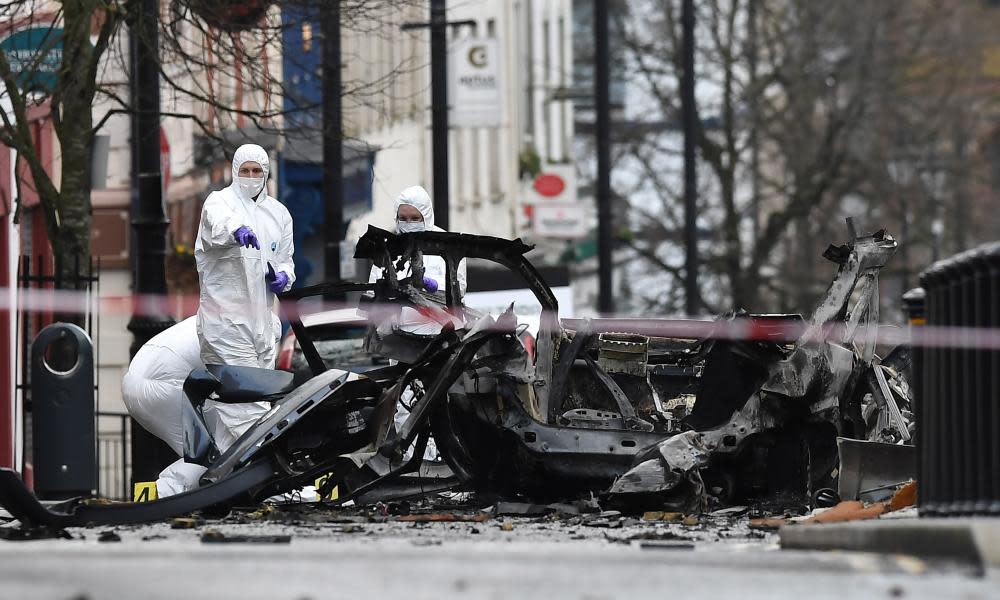Derry bomb attack: Northern Ireland police arrest two men

Police in Northern Ireland have arrested two men in connection with Saturday night’s car bomb in Derry city.
The suspects, both in their 20s, were detained early on Sunday after what police called an “unbelievably reckless” attack outside a courthouse in the heart of the city.
The New IRA, a dissident republican group, was the main line of inquiry, the assistant chief constable, Mark Hamilton, told a media briefing near the scene.
Police said they received approximately 10 minutes’ warning before the bomb exploded outside a courthouse on Bishop Street at 8.10pm, giving little time to evacuate hundreds of people from a nearby hotel, the Freemasons’ hall, youth club and other sites. There were no casualties.
A pizza delivery vehicle hijacked a short time earlier is believed to have been used in the attack. Witnesses said they heard a loud bang and saw a large plume of smoke.
A police forensics team was examining the scene on Sunday, with cordons sealing off access to the charred wreckage of the vehicle.
“At around 7.55pm last night officers on patrol in Bishop Street spotted a suspicious vehicle and were making checks when, around five minutes later, information was received that a device had been left at the courthouse,” Hamilton said in a statement released earlier on Sunday.
“We moved immediately to begin evacuating people from nearby buildings, including hundreds of hotel guests, 150 people from the Masonic Hall and a large number of children from a church youth club. The device detonated at 8.10pm.”
The attackers failed to kill or injure anyone, said Hamilton. “The people responsible for this attack have shown no regard for the community or local businesses. They care little about the damage to the area and the disruption they have caused,” he added.
No one claimed responsibility but suspicion fell on dissident Irish republicans opposed to the peace process.
A spate of bomb attacks in Derry in 2015, including a device found under a police officer’s car, was blamed on dissident republicans. They caused no casualties.
The Northern Ireland secretary, Karen Bradley, expressed concern and urged anyone with information about the attack to contact the police or Crimestoppers.
Bradley said: “This attempt to disrupt progress in Northern Ireland has rightly been met with utter condemnation from all parts of the community. The small number of people responsible have absolutely nothing to offer Northern Ireland’s future and will not prevail.
“Our voices across the political spectrum are united. This is intolerable violence and we want to look forward and build a peaceful future for all in Northern Ireland. ”
Simon Coveney, Ireland’s foreign minister, said the attack was an attempt to drag Northern Ireland back into violence and conflict.
Arlene Foster, the leader of the Democratic Unionist party, called it a “pointless act of terror” perpetrated by people with no regard for life.
The Foyle Sinn Féin MP, Elisha McCallion, also condemned the blast. She said: “Derry is a city moving forward and no one wants this type of incident. It is not representative of the city. I would encourage anyone with information about this incident to bring it to the police.”
A handful of small, radical republican groups reject power-sharing in Northern Ireland and accuse Sinn Féin of selling out by accepting the 1998 Good Friday agreement, which drew a line under the Troubles.
Saoradh, a fringe political party backed by New IRA prisoners, attributed the attack to “republican revolutionaries” and linked it to the centenary of the Soloheadbeg ambush on police in Tipperary, widely seen as the start of Ireland’s war of independence against Britain.
“It seems 100 years later Volunteer Sean Tracey’s comrades continue the unfinished revolution,” said the party’s website.
The attack bore all the hallmarks of the New IRA, which has made a point of targeting police and courts, said Marisa McGlinchey, the author of a forthcoming book, Unfinished Business: the Politics of ‘Dissident’ Irish Republicanism.
The group rejected the term dissident and sought to link itself to the IRA, which fought the war of independence a century ago, said McGlinchey, a professor at Coventry University. “It’s a very deliberate strike to try to underline continuity.”
Ireland’s culture minister, Josepha Madigan, is due on Monday to lay a remembrance wreath at the Solohead memorial. Monday is also the 100th anniversary of the first meeting of the Dáil, a breakaway parliament set up by Irish MPs who shunned Westminster.
Northern Ireland has drifted in a political vacuum since a row between Sinn Féin and the DUP collapsed the power-sharing executive at Stormont in 2017.
Brexit has compounded the instability by reviving contention over the border and and Northern Ireland’s constitutional status.
Andrew Adonis, the Labour peer, accused Brexiters of playing fast and loose with the region’s peace and stability.
“The prime minister should be in Derry-Londonderry today discussing the state of the city and security – & then go Belfast to meet all the parties & break the deadlock to set up a Northern Ireland Assembly & Government. Instead, Brexit, Brexit, Brexit,” he tweeted.

 Yahoo News
Yahoo News 
